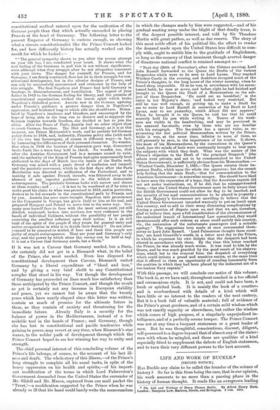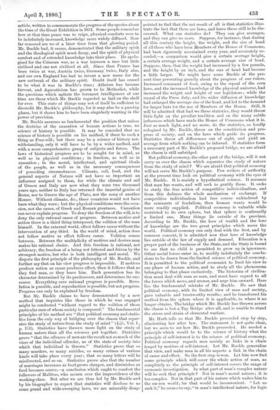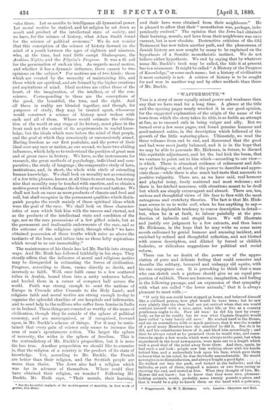LIFE AND WORK OF BUCKLE.* [SECOND NOTICE.] HAS Buckle any
claim to be called the founder of the science of history ? So far is this from being the case, that in our opinion, his work amounts to no more than a passing phase in the history of human thought. It reads like an overgrown leading
* The Life and Writings of Henry Thomas Buckle. By Alfred Henry Huth London: Sampson Low, Marston, Searle, and ItIvington. 2 vols. MO.
article, written to commemorate the progress of the species about the time of the Great Exhibition in 1851. Some people remember how at that time peace was to reign, physical comforts were to be indefinitely increased, knowledge more widely diffused. How far removed are we of a later time from that glowing period. Mr. Buckle had, it seems, demonstrated that the military spirit and the theological spirit must decay, and the spirit of physical comfort and of extended knowledge take their place. He apolo- gised for the Crimean war, as a war between a race but little
civilised and one not civilised at all. Since then France has been twice at war, Austria twice, Germany-. twice, Italy also,
and our own England has had to invent a new name for the new outbreak of the military spirit. Doubt itself has ceased to be what it was in Buckle's time ; Atheism has become fervent, and Agnosticism has grown to be Methodist, while the questions which agitate the foremost intelligences of our time are those which Mr. Buckle regarded as laid on the shelf for ever. This state of things may not of itself be sufficient to discredit Mr. Buckle's philosophy, for it may also be a passing phase, but it shows him to have been singularly wanting in the power of prevision.
Mr. Buckle assumes as fundamental the position that unless the doctrine of the causation of human actions is true, no science of history is possible. It may be conceded that no science of history is possible on his method, if there be such a thing as Free-will ; but there may be a science of history not- withstanding, only it will have to be by a wider method, and with a more comprehensive grasp of subjects and forces. The laws of historical progress are to be sought for in mind, as well as in physical conditions ; in freedom, as well as in causation ; in the moral, intellectual, and spiritual ideals of the people, as well as in the necessary consequences of preceding circumstances. Climate, soil, food, and the general aspects of Nature will not have so important an influence assigned to them, for while the climate and soil of Greece and Italy are now what they were two thousand years ago, neither to Italy has returned the imperial genius of Rome, nor to Greece the age of Plato, nor the song of another Homer. Without climate, dm., these countries would not have been what they were ; but the physical conditions were the occa- sion, not the cause, of Greek and Roman greatness. Causation can never explain progress. To deny the freedom of the will, is to deny the only rational cause of progress. Between motive and action there is a third thing interposed, the volition of the man himself. In the external world, effect follows cause without the intervention of any third. In the world of mind, action does not follow motive as effect follows cause. Volition comes between. Between the multiplicity of motives and desires man makes his rational choice. And this freedom is rational, not arbitrary, the freedom of a being not fettered and driven by the strongest motive, but who is both intelligent and moral. We dispute the first principle of the philosophy of Mr. Buckle, and further say that on his view progress is impossible. If motives produce action as cause produces effect, then it follows that as they find man, so they leave him. Each generation has its character determined by its predecessor, and determines its suc- cessor. Everything save rational progress is possible. Revo- lution is possible, and reproduction is possible, but not progress. Progress can only be explained by freedom.
But Mr. Buckle claims to have demonstrated by a new method that inquiries like those in which he was engaged
might be conducted "without regard to the volition of those particular men of whom society is composed." The fundamental principles of his method are "that political economy and statis- tics form the only way of bridging over the chasm that separ-
ates the study of nature from the study of mind" (Life, Vol. I., p. 151). Statistics have thrown more light on the study of
human nature than all the sciences put together. Statistics prove "that the offences of men are the result not so much of the vices of the individual offender, as of the state of society into which that individual is thrown." Statistics prove that so many murders, so many suicides, so many crimes of various kinds will take place every year ; that so many letters will be misdirected, and so on. Statistics prove also that the number of marriages increases as food grows cheaper, and diminishes as food becomes scarce,—a conclusion which ought to comfort the followers of Malthus, who mourn over the improvidence of the working-class. But after we are thus led by Mr. Buckle and by his biographer to expect that statistics will disclose to us some grand and wide-sweeping laws, we are miserably disap- pointed to find that the net result of all is that statistics illus- trate the fact that there are laws, and leave these still to be dis- covered. What can statistics do P They can give averages, and they can give no more. Suppose, for instance, that during' all this century the height, the weight, and the size of head of all those who have been Members of the House of Commons,.
had been rigorously ascertained every year, and accurately re- corded,—a comparison would give a certain average height, a certain average weight, and a certain average size of head.
Suppose, then, that the weight had increased by a few pounds, and the height by an inch, and the size of head had become a little larger. We might have some Buckle of the pre- sent time perorating grandly about the progress of our rulers. Increased command of food, owing to the repeal of the corn laws, and the increased knowledge of the physical universe, had increased the weight and height of our legislators ; while the repeal of the Press duty, and the wider diffusion of knowledge had enlarged the average size of the head, and led to the demand for larger hats for the use of Members of the House. Still, it will be admitted that had we these statistics, they would throw little light on the peculiar tradition and on the many subtle influences which have made the House of Commons what it is.. Just as much light, and no more, do the statistics, so loudly eulogised by Mr. Buckle, throw on the constitution and pro- gress of society, and on the laws which guide its progress. Statistics throw all differences out of sight, and yield an average from which nothing can be inferred. If statistics form a necessary part of Mr. Buckle's proposed bridge, we are afraid the chasm is still unbridged.
But political economy, the other part of the bridge, will it not carry us over the chasm which separates the study of nature from the study of mind P We are afraid that political economy will not serve Mr. Buckle's purpose. Few writers of authority at the present time look on political economy with the eyes of Mr. Buckle. It is mainly a hypothetical science. It assumes that man has wants, and will seek to gratify them. It seeks to study the free action of competitive indivividualism, and from this deduces the whole mechanism of exchange. If competitive individualism had free course unhindered by the remnants of feudalism, then human wants would be more readily supplied. Political economy is valuable while restricted to its own sphere, but that sphere is confessedly a limited one. Many things lie outside of its province- According to Mr. Buckle, the love of wealth and the love of knowledge are the two great principles which move the- world. Political economy can only deal with the first, and by
common consent, it is admitted now that love of knowledge lies outside of the law of supply and demand. Education is a
proper part of the business of the State, and the State is bound to see that no child is permitted to grow up in ignorance.. Other social forces enter in, to modify indefinitely the conclu- sions to be drawn from the limited science of political economy..
It is permitted to the political economist to limit his view to one phase of human action, and to study all the phenomena belonging to that phase exclusively. The historian of civilisa- tion must deal with man as man, and must have regard to all the forces which move, and arouse, and urge him onward. Here lies the fundamental mistake of Mr. Buckle. He saw that political economy, with its limited view of man and society,. gave valuable and trustworthy results ; and he transferred his method from the sphere where it is applicable, to where it no• longer obtains. The bridge which Mr. Buckle has thrown across the chasm is but a Tay Bridge after all, and is unable to stand the stress and strain of elemental warfare.
Mr. Huth tells us that Mr. Buckle proceeded step by step,. eliminating law after law. The statement is not quite clear,.
but we seem to see how Mr. Buckle proceeded. He needed a principle which would be to the science of history what the principle of self-interest is to the science of political economy.. Political economy regards men mainly as links in a chain forged by motives of self-interest. Let Mr. Buckle generalise
that view, and make man in all his aspects a link in the chain, of cause and effect. So the first step is won. Let him now find, some principle which will cover the whole action of man, as completely as the principle of self-interest covers the range of
economic investigation. In what part of man's complex nature will he seek that principle P Not in man's moral nature ; it is. too complex. Not in that part of his nature which unites him to.
the unseen world ; for that would be inconvenient. "Let us. seek it," he seem s to say," in man's intellectual nature, for logic. rules there. Let us ascribe to intelligence all dynamical power. Let moral motive be statical, and let religion be set down as result and product of the intellectual state of society, and we have, for the science of history, what Adam Smith found for the science of political economy." We do not wonder that this conception of the science of history dawned on the mind of a youth between the ages of eighteen and nineteen, -who, at the time, had read little except Shakespeare, the Arabian Nights, and the Pilgrim's Progress. It was a fit soil for the germination of such an idea. As regards moral motive, and whether it has a dynamic influence, there cannot be two -opinions on the subject.* For motives are of two kinds : those which are created by the necessity of maintaining life, and those which are spiritual, and are formed by the higher creations and aspirations of mind. Ideal motives are either those of the heart, of the imagination, of the intellect, or of the con- science. Corresponding to these are the conceptions of the good, the beautiful, the true, and the right. And all these in reality are blended together, and though, for purposes of study, they may be treated apart, whosoever would construct a science of history must reckon with each and all of them. Whoso would estimate the civilisa- tion of the world at any stage of its history, must place in the front rank not the extent of its acquirements in useful know- ledge, but the ideals which were before the mind of that people, and the goal at which they consciously or unconsciously aimed. Having freedom as our first postulate, and the power of their ideal over any race or nation, as our second, we have two abiding influences, which help us to understand the position of great men and of great races in history. We have, as the instruments for research, the great methods of psychology, individual and com- parative; the study of language ; the comparative study of laws, institutions, and, in short, the whole wide circle of extending Inman knowledge. We shall look on morality not as consisting -of a few trite phrases, known at all times to most men, but recog- nise that morality may be touched with emotion, and so obtain a motive-power which changes the destiny of men and nations. We shall not look on races as mere products of climate and food and soil, but shall recognise in the permanent qualities which distin- guish peoples the result mainly of those spiritual ideas which were the goal of the race. We shall look on those character- istics of man which link him with the unseen and eternal, not as the products of the intellectual state and condition of the age, nor as the rare possessions of a few gifted minds, but as the permanent and inalienable endowments of the race, and as the outcome of the religious spirit, through which "we have obtained possession of those truths which raise us above the instincts of the hour, and infuse into us those lofty aspirations which reveal to us our immortality."
The maintenance of his thesis has led Mr. Buckle into strange ways. And Mr. Huth has followed faithfully in his steps. They stoutly affirm that the influence of moral and religious motive may be disregarded in estimating the forces of civilisation. Progress, according to them, varies directly as doubt, and inversely as faith. Well, once faith came to a few scattered tribes in Arabia, bound them into a unity unknown before, and hurled them in a career of conquest half across the world. Faith was strong enough to send the nations of Europe in Crusade after Crusade to the Holy Land ; and religious faith and moral motive are strong enough to-day to -organise the splendid charities of our hospitals and infirmaries, and to send help to the millions who suffer from famine in India or in Ireland. These things are counted as worthy of the name of civilisation, though they lie outside of the sphere of political economy, and are unrecognised, or if recognised, frowned upon, in Mr. Buckle's scheme of things. For it may be main- tained that every gain of science only seems to increase the area of man's spontaneous action. The larger the sphere of necessity, the wider is the sphere of freedom. This is the contradictory of Mr. Buckle's proposition, but it is none the less true. Another proposition we should like to examine is, that the religion of a country is the product of its state of knowledge. Yet, according to Mr. Buckle, the French are better than their religion, and the Scottish people are worse than theirs. The Jews also had a religion which was far in advance of themselves. Where could they have obtained their religion, we wonder Following Mr. Buckle, Mr. Huth says, "Their morals, their learning,
See the beautiful analysis of the motive-power of morality, in that work of genius, Ecce Homo.
and their laws were obtained from their neighbours." He is pleased to allow that their "monotheism was, perhaps, inde- pendently evolved." The opinion that the Jews had obtained their learning, morals, and laws from their neighbours was once current, but is now obsolete. Destructive criticism of the Old Testament has now taken another path, and the phenomena of Jewish history are now sought by many to be explained on the hypothesis of a Semitic monotheistic instinct. We do not believe either hypothesis. We end by saying that by whatever name Mr. Buckle's book may be called, the title it at present has is a misnomer. It might be called "A History of the Progress of Knowledge," or some such name ; but a history of civilisation it most certainly is not. A science of history is to be sought for and won in another way and by other methods than those of Mr. Buckle.




































 Previous page
Previous page